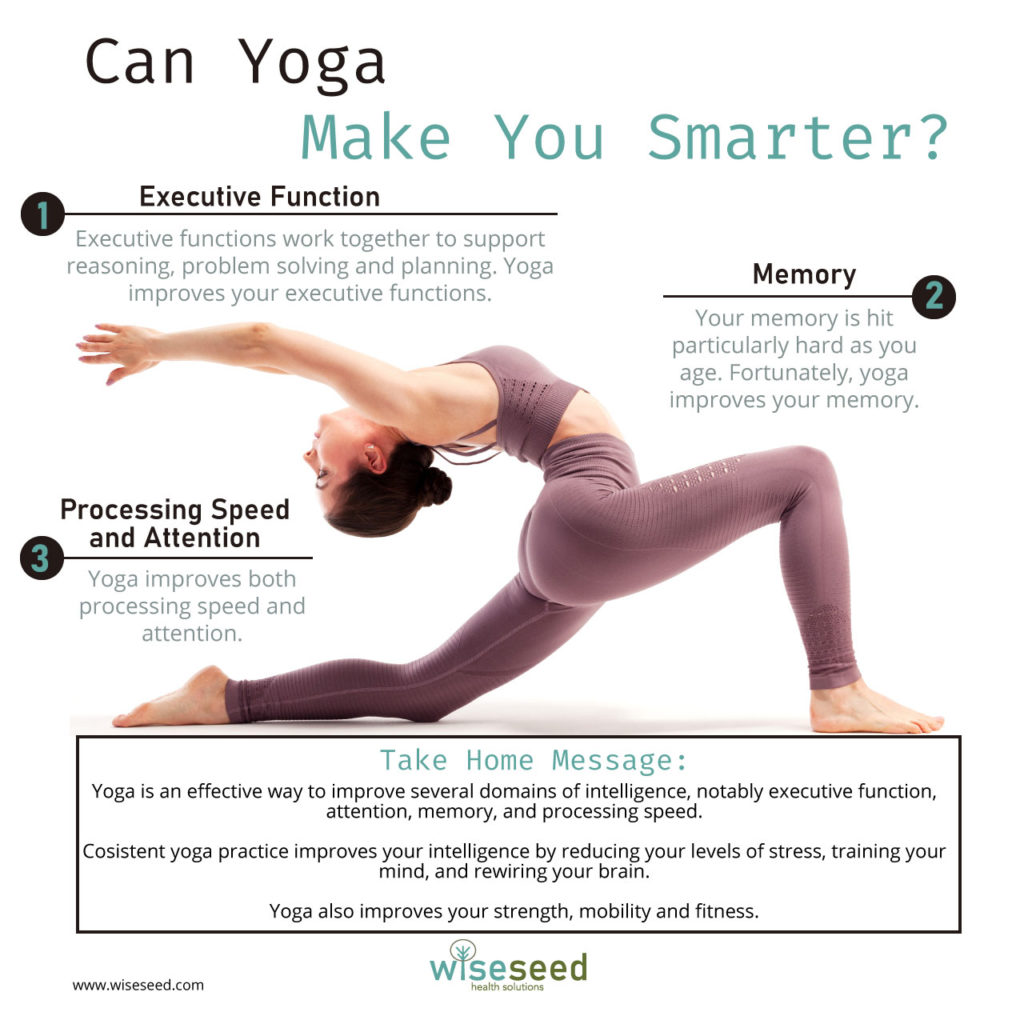Can Yoga Make You Smarter?

“If I had known I was going to live this long, I would have taken better care of myself.”
― Mae West
The process of getting old is undoubtedly one of the great tragedies of life. Cruel indeed is the relentless decline of our cognitive and physical prowess as we age.
However, all is not lost. As we’ve discussed in a previous article, for some people the biological age of their brains (their so-called Brain Age), is considerably younger than their chronological age. This striking observation implies that it may be possible to delay age-related cognitive decline. Indeed, we have previously discussed a variety of lifestyle interventions that you can use to reduce the rate of your cognitive decline.
One such lifestyle intervention is the consistent practice of yoga.
Yoga and Cognition
We’ve already written about how regularly practicing yoga helps protects your brain from the effects of age. However, three recently published reviews provide further support for this idea. For this reason, I thought it informative to briefly revisit this important topic.
The Research
In the first review, Small and Colleagues performed a meta-analysis on eleven clinical trials and one observational study that measured the effects of yoga on cognition (1). The studies included in the analysis assessed the effect of yoga interventions on the cognition of healthy adults, as well as on adults suffering from mild cognitive impairment or dementia (1).
In the second study, Halgreen and Colleagues analysed five clinical trials that explored the effects of yoga on cognitive power, focusing exclusively on studies performed on healthy adults over the age of sixty (2).
Finally, Van Laere and Colleagues reviewed the latest research on how yoga practice changes the structure and function of your brain (3).
Does yoga improve cognitive function?
1. Executive Function
Executive functions (EF) are a group of fundamental processes that work together to support reasoning, problem solving and planning. Fortunately yoga has positive effect on executive function (1, 2). The effect is slightly stronger in healthy adults compared to those with cognitive impairment or dementia (1). Nevertheless, yoga interventions improved executive in all of the groups tested (1).
2. Memory
Your memory is hit particularly hard as you grow old. Thus, I am pleased to report that yoga interventions have a positive effect on memory in older adults (1, 2). This is true for both healthy adults and adults suffering mild cognitive impairment/dementia (1, 2).
3. Processing Speed and Attention
Yoga interventions improved both processing speed and attention (1, 2). This was observed in healthy older adults (1, 2), and to a lesser extent in adults with mild cognitive impairment/dementia (1).
How does yoga improve your cognition?
As discussed above, the consensus emerging from multiple clinical trials is that yoga is a safe and effective way to improve several critical domains of your intelligence, notably executive function, attention, memory, and processing speed. But how does this occur?
1. Stress Reduction
One way yoga improves cognitive function likely is through stress reduction. Chronic stress damages important structures of your brain (4). Fortunately, yoga practice is a highly effective approach to reduce stress (3). In this context, the stress-reducing effects of consistent yoga practice are thought to prevent stress-induced brain damage (3).
How does yoga reduce stress? One likely mechanism is that yoga practice stimulates your vagus nerve. I know this may sound a little bit kinky, but stick with me here!
The vagus nerve is involved in the parasympathetic regulation of your heart, lungs and intestinal tract. Your parasympathetic nervous system is the opposite of your fight-and-flight sympathetic nervous system. As such, it’s been referred to as the “rest-and-digest” or “feed and breed” system of your body (5).
Right now, vagus nerve stimulation is being used to treat drug-resistant cases of clinical depression (6). Amazingly, the vagus nerve is activated during yoga practice through deep breathing and certain yoga poses (3). This phenomenon certainly helps explain why yoga practice is so effective at reducing stress!
2. Cognitive Training
Many forms of yoga incorporate mindfulness training. Mindfulness is a form of cognitive training that targets specific regions of your brain, in particular neural networks involved in consciousness and attention (3, 7).
Unsurprisingly, yoga and other mindful practices such as meditation display many overlapping benefits (3). However, yoga also has the added benefit of training the brain regions involved in posture and balance (3), as well as improving your overall fitness, strength and mobility.
3. Brain Rewiring
Controlling stress and consistently engaging in focused cognitive training changes your brain. Briefly, the studies to date consistently show that yoga increases grey matter volume in your insula and hippocampus, increases the activation of your prefrontal cortex, and changes the connectivity of your neural networks, particularly within your default mode network (3).
For your everyday yoga practice, these details don’t matter. What’s important is the understanding that consistent yoga practice changes the structure, activity and connectivity of your brain. This is what protects you from cognitive decline.
The Take Home Message
The preponderance of evidence reveals that yoga is an effective way to improve several domains of intelligence; notably executive function, attention, memory, and processing speed.
Fortunately, yoga is an enjoyable form of exercise that can safely be performed by most people. Further, you can easily do yoga at home by following one of the many excellent online yogis!
Please click on the link below to download your free PDF.

Reference and Further Reading
1. K. K. Bhattacharyya, R. Andel, B. J. Small, Effects of Yoga-Related Mind-Body Therapies on Cognitive Function in Older Adults: A Systematic Review with Meta-Analysis. Archives of Gerontology and Geriatrics, 104319 (2020).
2. S. Hoy, J. Östh, M. Pascoe, A. Kandola, M. Hallgren, Effects of yoga-based interventions on cognitive functioning in healthy older adults: a systematic review of randomized controlled trials. Complementary Therapies in Medicine, 102690 (2021).
3. J. van Aalst, J. Ceccarini, K. Demyttenaere, S. Sunaert, K. Van Laere, What has neuroimaging taught us on the neurobiology of yoga? a review. Frontiers in Integrative Neuroscience 14, 34 (2020).
4. H. Yaribeygi, Y. Panahi, H. Sahraei, T. P. Johnston, A. Sahebkar, The impact of stress on body function: A review. EXCLI Journal 16, 1057 (2017).
5. L. K. McCorry, Physiology of the autonomic nervous system. American Journal of Pharmaceutical Education 71, (2007).
6. C. Daban, A. Martinez-Aran, N. Cruz, E. Vieta, Safety and efficacy of Vagus Nerve Stimulation in treatment-resistant depression. A systematic review. Journal of Affective Disorders 110, 1-15 (2008).
7. T. Brandmeyer, A. Delorme, H. Wahbeh, The neuroscience of meditation: classification, phenomenology, correlates, and mechanisms. Prog Brain Res 244, 1-29 (2019).
Acknowledgements
Photos by Ketut Subiyanto from Pexels and by Nobilior at Adobe Stock.
Disclaimer
The material displayed on this website is provided without any guarantees, conditions or warranties as to its accuracy.
Information written and expressed on this website is for education purposes and interest only. It is not intended to replace advice from your medical or healthcare professional.
You are encouraged to make your own health care choices based on your own research and in conjunction with your qualified practitioner.
The information provided on this website is not intended to provide a diagnosis, treatment or cure for any diseases. You should seek medical attention before undertaking any diet, exercise, other health program or other procedure described on this website.
To the fullest extent permitted by law we hereby expressly exclude all warranties and other terms which might otherwise be implied by statute, common law or the law of equity and must not be liable for any damages whatsoever, including but without limitation to any direct, indirect, special, consequential, punitive or incidental damages, or damages for loss of use, profits, data or other intangibles, damage to goodwill or reputation, injury or death, or the cost of procurement of substitute goods and services, arising out of or related to the use, inability to use, performance or failures of this website or any linked sites and any materials or information posted on those sites, irrespective of whether such damages were foreseeable or arise in contract, tort, equity, restitution, by statute, at common law or otherwise.

Ten Minutes is All You Need
Research has shown that ten minutes of moderate-to-vigorous exercise performed each day is enough to significantly reduce your risk of early death.




